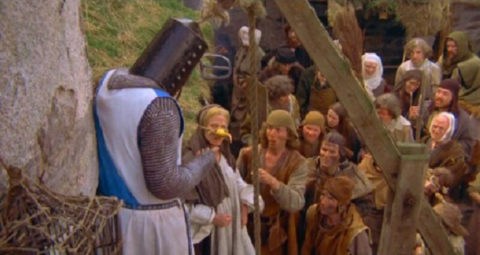In Wrong Side of History, Ed West considers the apparent rising interest in Europe’s Middle Ages and Renaissance in popular culture:
The genre has been aided by developments in cinematic technology, allowing the sort of special effects that made such productions in the 1980s and 90s somewhat ridiculous. But there may be deeper cultural significance to this medieval revival, and it is one that evokes a strange discomfort in many people. Because, while the academic field of medieval studies has become a branch of progressive theology, medievalism as expressed through popular culture feels much more conservative, and to some minds, even fascistic. At the very least, it is “Right-coded”.
This discomfort often flares up whenever a new film or series attempts to capture our imagination, voiced in comment pieces warning us that they might be popular for the wrong reasons, among unsavoury elements.
This is what happened with Viking epic The Northman, despite director Robert Eggar’s impeccably progressive politics. “The Northman‘s 10th-century society appears to be uniformly white and firmly divided along patriarchal lines,” The Guardian warned: “Men do the ruling and killing; women do the scheming and baby-making. Its hero, played by Alexander Skarsgård, is not a million miles from the ‘macho stereotype’ Eggers complained of – a brawny warrior who settles most disputes with a sword and without a shirt. Skarsgård’s love interest, played by Anya Taylor-Joy, could be the far-right male’s dream woman: beautiful, fair-haired, loyal to her man and committed to bearing his offspring. Even before the film’s release, far-right voices were giving their approval on the anonymous message board site 4chan.”
Wow, expressing approval of a beautiful, fair-haired woman who wants to settle down and have your children? Better call Prevent!
According to a piece in the Economist, the new fixation with the Middle Ages dates to the September 11 attacks, when “the American far right … developed a fascination with the Middle Ages and the Renaissance — in particular, with the idea of the West as a united civilisation that was fending off a challenge from the East …
“The embrace of the medieval extends from the alt-right online forum culture that has exploded in the last few years to stodgier old-school racists. Helmeted crusaders cry out the Latin war-cry ‘Deus vult!’ from memes circulated on Reddit and 4Chan. Images of Donald Trump, clad in mail with a cross embroidered on his chest, abound. Anti-Islam journals and websites name themselves after the Frankish king Charles Martel, who fought Muslim armies in the 8th century, or the (slightly post-medieval) Ottoman defeat at Vienna.”
This concern is real enough that I’ve noticed a trend for medieval historians to introduce their books with what might be best described as health warnings, lest they be enjoyed in the wrong way. Neil Price’s The Children of Ash and Elm, for instance, comes with a declaration of values in the introduction:
Over the centuries, a great many people have eagerly pressed the Vikings into (im)moral service, and others continue to do so… I strongly believe that any meaningful twenty-first-century engagement with the Vikings must acknowledge the often deeply problematic ways in which their memory is activated in the present …
The Viking world this book explorers was a strongly multi-cultural and multi-ethnic place, with all this implies in terms of population movement, interaction (in every sense of the word, including the most intimate), and the relative tolerance required. This extended far back into Northern prehistory. There was never any such thing as a “pure Nordic” bloodline, and the people of the time would have been baffled by the very notion. We use “Vikings” as a consciously problematic label for the majority population of Scandinavia, but they also shared their immediate world with others – in particular, the semi-nomadic Sami people. Their respective settlement histories stretch so deeply into the Stone Age past as to make any modern discussion of “who came first” absurd. Scandinavia had also welcomed immigrants for millennia before the Viking Age, and there is no doubt that a stroll through the market centres and trading places of the time would have been a vibrantly cosmopolitan experience.
Well, I won’t be recommending Mr Price’s book to my friends at 4Chan, I can tell you that.




